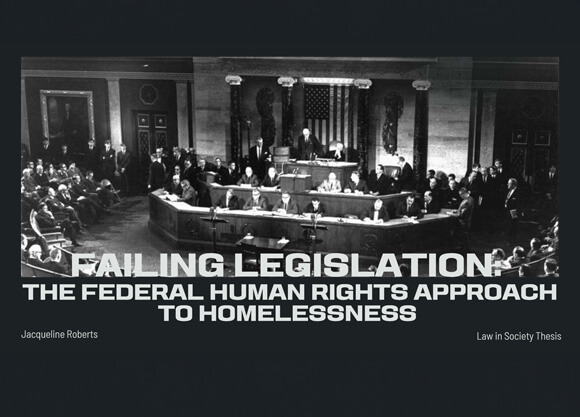Law in Society
The Federal Human Rights Approach to Homelessness

Law in Society
The Federal Human Rights Approach to Homelessness
The ambiguous definition of homelessness led to legislation for states being drastically different, which shapes the experience of a person experiencing homelessness based on where they happen to be geographically. With this research, Jacqueline Roberts ’24 created this proposed bill to make a step toward alleviating the issue in the United States.
Overview
With the current definition of homelessness focusing on the lack of a place for an individual to sleep but failing to mention the importance of a place to live in a general sense, this proposed bill redefines homelessness on a federal level using language from treaties discussing human rights.
Author

Jacqueline Roberts '24
Law in Society
College of Arts & Sciences
Failing Legislation: The Federal Human Rights Approach to Homelessness
42 U.S. CODE § 11302
“The terms ‘homeless’, ‘homeless individual’, and ‘homeless person’ means— [1] an individual or family who lacks a fixed, regular, and adequate nighttime residence”
This definition only includes a place to sleep as opposed to overall living. This failure to address the full day is a human rights violation.
Human Rights
Established through the
-
Universal Declaration of Human Rights
-
International Covenant on Civil and Political Rights (ICCPR)
-
International Covenant on Economic, Social and Cultural Rights (ICESCR)
Relevant Cases
Martin v. Boise (2018)
-
Argued the ordinances in Boise, Idaho that prohibited camping on public property. They argued that this criminalized homelessness since there weren't enough resources in the state.
Singleton v. Montgomery (2019)
-
Discussed how panhandling in Mongomery, Alabama, being criminalized and met with fines was a violation of their First Amendment rights.
Johnson v. Grants pass (2024)
-
Gloria Johnson is arguing that Grants Pass, Ohio, is violating the Eighth Amendment by fining people who are homeless for having public encampments.
Treaties Have Been Looked to as the Solution
-
Treaties are non-binding.
-
Treaties have a multistep process before being entered into force.
-
The domestic law must be in accordance with the language of the treaty for the signatory parties.
-
They are treated as the supreme law of the land.
Why Doesn’t The United States Join Treaties?
The United States has not joined many treaties, such as the International Covenant on Economic, Social, and Cultural Rights (ICESCR)
-
Reasons for this include control, politicization and the desire for autonomy.
Solution: A Bill
Key Points of the Bill
-
“Homelessness” means (a) an individual or family who lacks a regular, safe, and sufficient residence (b) an individual or family with a primary residence that is a public or private place not designed for or ordinarily used as a regular living accommodation for human beings, including a car, park, abandoned building, bus or train station, airport, or camping ground
-
“(A) ICESCR (Article 11 Section 1)— The United States recognizes the right of everyone to an adequate standard of living for himself and his family, including adequate food, clothing and housing, and to the continuous improvement of living conditions.
-
“(B) UDHR (Article 22)— Everyone, as a member of society, has the right to social security and is entitled to realization, through national effort and international cooperation and in accordance with the organization and resources of each state, of the economic, social and cultural rights indispensable for his dignity and the free development of his personality.
The Bill
To provide a path to end homelessness in the United States by adopting language that aligns with the language of human rights treaties.
Be it enacted by the Senate and House of Representatives of the United States of America in Congress assembled.
SECTION 1. SHORT TITLE.
This Act may be cited as the "Reclassifying Homeslessness as a Human Right Act of {...} ".
SEC. 2. CONGRESSIONAL FINDINGS.
The Congress finds that —
(1) although the United States has experienced forms of legislation addressing , these findings have not classified it as a Federal Human Rights issue as this bill does.
(2) according to the Department of Housing and Urban Development’s 2018 point-in-time count, there were around half a million people currently experiencing homelessness in the United States under the former.
(3) homelessness in many communities has reached crisis proportions and some cities have declared that homelessness has reached a state of emergency; and
(4) the Federal Government must renew its commitment to the national goals to end.
Sec. 2. (NEW) (...) (a) As used in this section:
(1) “Homelessness” means (a) an individual or family who lacks a regular, safe, and sufficient residence (b) an individual or family with a primary residence that is a public or private place not designated for or ordinarily used as a regular sleeping accommodation for human beings, including a car, park, abandoned building, bus or train station, airport, or camping ground.
(2) "Residence" means place of general abode belonging to or being lived in through legal means by an individual.
(3) “Human Rights” means rights which are inherent to all human beings, regardless of race, sex, nationality, ethnicity, language, religion, or any other status.
Professional Application
“This research has not only expanded my understanding of legislation's strengths and limitations but also equipped me with practical insights. My two-year stint at the Senate Democrats Office of the Connecticut General Assembly, coupled with the research I conducted for my senior thesis, has reinforced my commitment to politics.” - Jacqueline Roberts ’24
For Further Disucssion
This serves as an overview of the project and does not include the complete work. To further discuss this project, please email Jacqueline Roberts.
Course Overview
LE 490: Senior Seminar in Law in Society is the capstone course for law in society majors. In this seminar, students must research a legal issue of their choosing; critically examine how our legal system addresses, or fails to address, the issue; and recommend a change in our approach, suggest an alternative interpretation, or highlight a particularly effective response to the issue. Students ultimately produce legal scholarship with a focused thesis developed through substantial research and analysis. The course culminates in each student completing a publishable quality thesis and presenting that work to the class orally.
Explore Our Areas of Interest
We've sorted each of our undergraduate, graduate and doctoral programs into unique Areas of Interest. Explore these categories to discover which programs and delivery methods best align with your educational and career goals.
